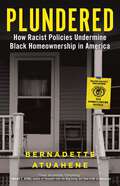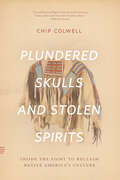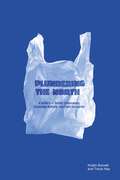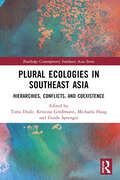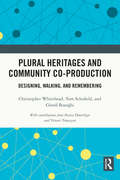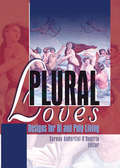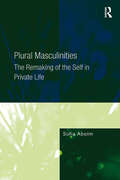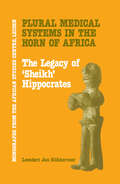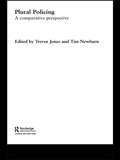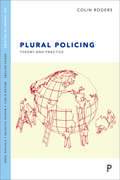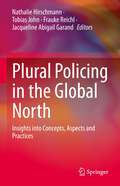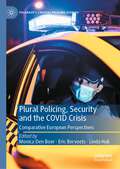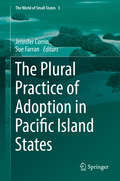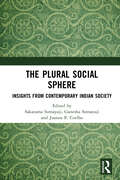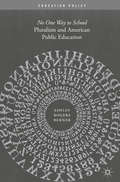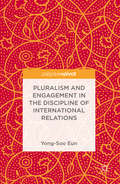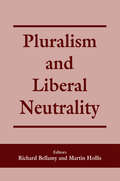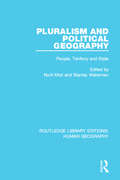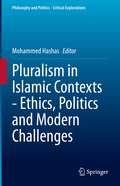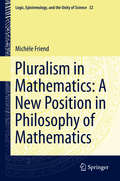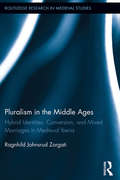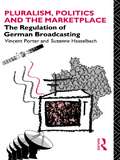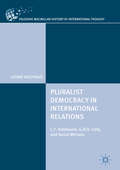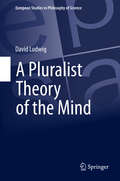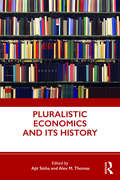- Table View
- List View
Plundered: How Racist Policies Undermine Black Homeownership in America
by Bernadette Atuahene"Clear. Accessible. Compelling." —Ibram X. Kendi, MacArthur Genius fellow and author of Stamped from the Beginning and How to Be an Antiracist In the spirit of Evicted, a property law scholar uses the stories of two grandfathers—one white, one Black—who arrived in Detroit at the turn of the twentieth century to reveal how racist policies weaken Black families, widen the racial wealth gap, and derive profit from pain. When Professor Bernadette Atuahene moved to Detroit, she planned to study the city&’s squatting phenomenon. What she accidentally found was too urgent to ignore. Her neighbors, many of whom had owned their homes for decades, were losing them to property tax foreclosure, leaving once bustling Black neighborhoods blighted with vacant homes. Through years of dogged investigation and research, Atuahene uncovered a system of predatory governance, where public officials raise public dollars through laws and processes that produce or sustain racial inequity—a nationwide practice in no way limited to Detroit. In this powerful work of scholarship and storytelling, Atuahene shows how predatory governance invites complicity from well-meaning people, eviscerates communities, and widens the racial wealth gap. Using a multigenerational narrative, Atuahene tells a riveting tale about racist policies, how they take root, why they flourish, and who profits.
Plundered Skulls and Stolen Spirits: Inside the Fight to Reclaim Native America's Culture
by Chip ColwellWho owns the past and the objects that physically connect us to history? And who has the right to decide this ownership, particularly when the objects are sacred or, in the case of skeletal remains, human? Is it the museums that care for the objects or the communities whose ancestors made them? These questions are at the heart of Plundered Skulls and Stolen Spirits, an unflinching insider account by a leading curator who has spent years learning how to balance these controversial considerations. Five decades ago, Native American leaders launched a crusade to force museums to return their sacred objects and allow them to rebury their kin. Today, hundreds of tribes use the Native American Graves Protection and Repatriation Act to help them recover their looted heritage from museums across the country. As senior curator of anthropology at the Denver Museum of Nature & Science, Chip Colwell has navigated firsthand the questions of how to weigh the religious freedom of Native Americans against the academic freedom of scientists and whether the emptying of museum shelves elevates human rights or destroys a common heritage. This book offers his personal account of the process of repatriation, following the trail of four objects as they were created, collected, and ultimately returned to their sources: a sculpture that is a living god, the scalp of a massacre victim, a ceremonial blanket, and a skeleton from a tribe considered by some to be extinct. These specific stories reveal a dramatic process that involves not merely obeying the law, but negotiating the blurry lines between identity and morality, spirituality and politics. Things, like people, have biographies. Repatriation, Colwell argues, is a difficult but vitally important way for museums and tribes to acknowledge that fact—and heal the wounds of the past while creating a respectful approach to caring for these rich artifacts of history.
Plundering the North: A History of Settler Colonialism, Corporate Welfare, and Food Insecurity
by Kristin Burnett Travis HayThe manufacturing of a chronic food crisis Food insecurity in the North is one of Canada’s most shameful public health and human rights crises. In Plundering the North, Kristin Burnett and Travis Hay examine the disturbing mechanics behind the origins of this crisis: state and corporate intervention in northern Indigenous foodways. Despite claims to the contrary by governments, the Hudson’s Bay Company (HBC), and the contemporary North West Company (NWC), the exorbitant cost of food in the North is neither a naturally occurring phenomenon nor the result of free-market forces. Rather, inflated food prices are the direct result of government policies and corporate monopolies. Using food as a lens to track the institutional presence of the Canadian state in the North, Burnett and Hay chart the social, economic, and political changes that have taken place in northern Ontario since the 1950s. They explore the roles of state food policy and the HBC and NWC in setting up, perpetuating, and profiting from food insecurity while undermining Indigenous food sovereignties and self-determination. Plundering the North provides fresh insight into Canada’s settler colonial project by re-evaluating northern food policy and laying bare the governmental and corporate processes behind the chronic food insecurity experienced by northern Indigenous communities.
Plural Ecologies in Southeast Asia: Hierarchies, Conflicts, and Coexistence (Routledge Contemporary Southeast Asia Series)
by Timo Duile Kristina Großmann Michaela Haug Guido SprengerThis book draws on ethnographic studies in Southeast Asia to provide new insights into human–environmental relationships and ecologies, together with a set of theoretical innovations. Contextualizing ecologies in this region as pluralizing or hegemonic, conflictive or cooperative, the case studies in these chapters bring into dialogue ontological approaches, the issue of distinct worldviews and concepts of nature on the one hand and political ecology and power relations on the other. They discuss plural ecologies in diverse settings, reaching from urban Vietnam to the Javanese coast and the dense forests of the Southeast Asian highlands. Southeast Asia is one of the most biodiverse and culturally diverse regions in the world. Thus, what occurs in this region is vitally important to the future of Earth. Documenting the plurality and dynamics of ecologies in Southeast Asia, this book provides prime examples for the potentials of alternative human–environmental relationships and sustainable development. It will be of interest to academics studying political ecology, environmental anthropology, sustainability sciences, political sciences, development studies, human geography, human ecology, Southeast Asian studies, and Asian studies.
Plural Heritages and Community Co-production: Designing, Walking, and Remembering
by Christopher Whitehead Tom Schofield Gönül BozoğluPlural Heritages and Community Co-production is a landmark contribution on the nature and plurality of heritages and how they can be creatively and ethically presented in urban space. Providing an overview of the concept of plural heritages, this book explores the theory, politics, and practice of community co-production as they intersect with currents in critical heritage thinking, walking as ethnography, and digital design methods. Told through a central case study in Istanbul, Turkey, this volume aligns with cultural and political imperatives to consider the plural values, meanings, affects, and relativities of heritage sites for the multiple communities who live – or, as for diaspora and displaced groups, have lived – with them. It suggests a range of methods for locating and valorising alternative perspectives to those centrally deployed through museums or other institutions, such as UNESCO World Heritage listing, while also exploring the complexities of the past in the present and the ontology of heritage. Plural Heritages and Community Co-production will be of great interest to researchers, academics, postgraduate students in the fields of heritage and memory studies, museum studies, history, geography, cultural studies, sociology, anthropology, and politics. The book will also be of interest to heritage professionals, policy makers, and site managers involved in community engagement and participation.
Plural Loves: Designs for Bi and Poly Living
by Serena Anderlini-D'OnofrioWhen limitations are removed from loving (and from lovemaking), new worlds of possibility are opened. This book presents insiders&’ viewpoints on bisexual/polyamorous living!With historical and theoretical perspectives, testimonials, reports from the field, and creative writing, Plural Loves: Designs for Bi and Poly Living examines group marriage, polyfidelity, cheating, solo-sex (and group solo-sex), utopian communities, tantric expression and sacred eroticism, transculturalization, and much more. This book explores the common ground shared by the bisexual and polyamorist movements, and addresses the ways bisexual polyamory has been portrayed in films and literature in the United States and Europe. Editor Serena Anderlini-D&’Onofrio even includes a candid chapter recounting her erotic experiences with a Catholic priest from Africa-and their meaning in the context of bisexual polyamory.Plural Loves: Designs for Bi and Poly Living presents: insider perspectives from members of polygamous groups, including the polyamorous circle "Komaja" and the Trent Polyamory Society insights into the benefits of self-sex for singles/couples/poly people a look at poly living as tantric expression an examination of the way polyamory is addressed in three modern texts: Love Without Limits, Loving More: The Polyfidelity Primer, and The Ethical Slut-and in the work of two nineteenth-century novelists, J. K. Huysmans and Leopoldo Alas, and of three twentieth century dramatists, Noel Coward, Joe Orton, and Shelagh Delaney an analysis of portrayals of polyamorous people in American and foreign films, including When Two Won&’t Do, Y tu mama también, Teorema, Something for Everyone, Sunday Bloody Sunday, Straight to the Heart, Henry and June, Threesome, Dallas Doll, Friend of the Family, French Twist, and Go Fish. a contribution from Deborah Taj Anapol about poly practices indigenous to Hawaii plus a fascinating chapter by well-known feminist/sex activist Betty Dodson that places masturbation in the context of homosexual activity (it is a same-sex activity, after all)
Plural Masculinities: The Remaking of the Self in Private Life
by Sofia AboimPlural Masculinities offers a contemporary portrait of the plural dynamics and forms of masculinity, emphasizing the multiple, even contradictory, pathways through which men are remaking their identities. Proceeding from the premise that it is impossible to fully understand masculinity without considering its connection with family change and women's change, it places men and masculinities within the realm of family life, examining men's practices and discourses in their relationships with women and their changing femininities. Combining an empirical study based in Portugal with cross-national analyses of attitudes towards ideal gender arrangements in Europe and the USA, this book examines the various ways in which men come to define their identities and will appeal to those working in the fields of masculinities, gender studies and the sociology of the family.
Plural Medical Systems In The Horn Of Africa: The Legacy Of Sheikh Hippocrates
by SlikkerveerFirst Published in 1990. Routledge is an imprint of Taylor & Francis, an informa company.
Plural Policing: A Comparative Perspective
by Trevor Jones Tim NewburnPolicing is changing rapidly and radically. An increasingly complex array of public, private and municipal bodies - as well as public police forces - are engaged in the provision of regulation and security. Consequently, it is difficult to think of security provision primarily in terms of what the public police do, and so the terminology of 'fragmented' or 'plural' policing systems has become well-established within criminology and police science. 'Plural policing' is now a central issue within criminology and police studies throughout the world, and there is now a large and growing body of research and theory concerned with its extent, nature and governance. To date, however, this work has been dominated by Anglo-American perspectives. This volume takes a detailed comparative look at the development of plural policing, and provides the most up-to-date work of reference for scholars in this field. Edited by two of the world's leading authorities on policing, and including individual contributions from internationally recognised experts in criminology and police studies, this is the first ever volume to focus on ‘plural policing’ internationally, and to draw together empirical evidence on its developments in a formal comparative framework.
Plural Policing: Theory and Practice (Key Themes in Policing)
by Colin RogersThe police increasingly need to work with other government agencies, the third sector, community organisations and the private sector, an approach known as “Plural Policing”. This book critically analyses the rise of this approach in England and Wales over the past decade, giving examples of national and international practice. Written by an author with experience in both practice and academia, it discusses the consequences of this approach for the historical model of policing provision and challenges views on how policing should be delivered in the future. Part of Key themes in policing, a textbook series designed to fill a growing need for research-informed policing within Higher Education curriculums and in practice, edited by Megan O’Neill, Marisa Silvestri & Stephen Tong, this accessible text, aimed primarily at undergraduate students, will appeal widely across different modules and tie into important issues covered on all policing courses.
Plural Policing in the Global North: Insights into Concepts, Aspects and Practices
by Nathalie Hirschmann Tobias John Frauke Reichl Jacqueline Abigail GarandThe volume brings together an international group of authors discussing basic concepts and approaches to plural policing as well as aspects and practices of plural policing in specific locations. The context comes from the fact that policing activities are nowadays performed by a growing number and variety of police and non-police stakeholders. This development is internationally discussed as ‘pluralisation of policing’ or plural policing. This book provides insights into plural policing across different countries of the global North. It looks at day-to-day security which is mainly produced at the local level, and where there is considerable diversity in philosophy and practice. Therefore, it allows learnings for possible future developments in the field. This volume contributes to policing studies and is of interest to the wide range of academics dealing with questions of security and order, as well as policy makers and practitioners working on security in their regions.
Plural Policing, Security and the COVID Crisis: Comparative European Perspectives (Palgrave's Critical Policing Studies)
by Monica Den Boer Eric Bervoets Linda HakThis book critically examines how countries across Europe have dealt with the COVID crisis from a policing and security perspective. Across the chapters, contributors from different countries examine the data, press coverage, and provide professional observations on how policing, law enforcement, police powers and community relations were managed. They focus on how security and governmental actors often failed to align with the formal scripts that were specifically designed for crisis-management, resulting in the wavering application of professional discretion and coercive powers. Their different approaches were evident: in some regions police were less dominantly visible compared to other regions, where the police used a top-down visible and repressive stance vis-à-vis public alignment with COVID rules, including the imposition of lockdown and curfews. Some contributors draw on data from the COROPOL (Corona Policing) Monitor which collated data on crime, plural policing and public order in Europe and around the world during the early phases of the COVID crisis. Overall, this book seeks to provide comparative critical insights and commentary as well as a practical and operational understanding of security governance during the COVID-19 crisis and the lessons learned to improve future preparedness.
The Plural Practice of Adoption in Pacific Island States (The World of Small States #5)
by Jennifer Corrin Sue FarranThis book deals with adoption laws and practices in small island developing states in the Pacific. It commences with an introductory chapter giving an overview of relevant laws and practices and pulling together the common themes and issues raised in the book. Each of the following chapters deals with adoption law and practice in a small South Pacific country. The countries in question all have plural legal systems, with systems of adoption and its closest customary law equivalent operating side by side. In most cases, there is an insufficiently developed relationship between the two systems, which has resulted in a number of problems. Additionally, international law adds another layer of complexity. Size and remoteness in the small states under discussion have a profound impact on local practices.
The Plural Social Sphere: Insights from Contemporary Indian Society
by Sakarama SomayajiThis book reiterates pluralism as the basic feature of the Indian social sphere. It highlights challenges to the continuity of the plural fabric of India’s society and culture. Acknowledging that socio-political concerns on women’s issues do not always find adequate representation in social science texts, the book explores issues and policies related to gender. It locates the roots of feminist fundamentalism, studies the reactions to it, and brings forth the demands relating to new agendas and strategies for feminism. The authors also present empirical studies on issues faced by minority communities in India.An important contribution, this book will be of interest to scholars and researchers of sociology, political sociology, gender studies, exclusion studies, South Asian studies, Affirmative action, and political science.
Pluralism and American Public Education
by Ashley Rogers BernerThis book argues that the structure of public education is the main reason America's public education system is failing to fulfill the intellectual, civic, and moral aims for which it was created. The book challenges the philosophical basis for the traditional common school model and defends the educational pluralism that most liberal democracies enjoy. Berner provides a unique theoretical pathway that is neither libertarian nor state-focused and a pragmatic pathway that avoids the winner-takes-all approach of many contemporary debates about education. For the first time in nearly one hundred fifty years, changing the underlying structure of America's public education system is both plausible and possible, and this book attempts to set out why and how.
Pluralism and Engagement in the Discipline of International Relations
by Yong-Soo EunThis book identifies and addresses subtle but important questions and issues associated with the configuration of International Relations as a discipline. Starting with a much-needed discussion of manifold implications and issues associated with pluralism, the book raises important questions, such as where does the field of IR stand in terms of epistemological, theoretical, and methodological diversity. The book also carries out a comparative analysis of the present status of post-positivist IR scholarship in the United States and China. Eun discusses these questions through a close reading of the key texts in the field and by undertaking a critical survey of publishing and teaching practices in IR communities. IR scholars will gravitate to this text that fills many gaps in international political theory.
Pluralism and Liberal Neutrality
by RICHARD BELLAMY; MARTIN HOLLISThe crisis of liberalism is in its claim to endorse neutral procedures that allow individuals and groups to pursue their own good, when the very possibility of such neutrality is affected by the growth of plural societies, and resulting divisions of loyalty. This collection explores this crisis.
Pluralism and Political Geography: People, Territory and State (Routledge Library Editions: Human Geography #12)
by Stanley Waterman Nurit KliotIn this comprehensive study, problems of racial and religious division are examines in places as diverse as Northern Ireland and the West Bank. Territorial and spatial expression, intergovernmental relationships in federal states, alliance blocs within the United Nations and American foreign policy are among the wide range of subjects covered. The problems are considered using both traditional and radical approaches, but throughout, the book argues that apply the concept of pluralism isn the best way of understanding the political geography of the modern world.
Pluralism in Islamic Contexts - Ethics, Politics and Modern Challenges (Philosophy and Politics - Critical Explorations #16)
by Mohammed HashasThis book brings together international scholars of Islamic philosophy, theology and politics to examine these current major questions: What is the place of pluralism in the Islamic founding texts? How have sacred and prophetic texts been interpreted throughout major Islamic intellectual history by the Sunnis and Shi‘a? How does contemporary Islamic thought treat religious and political diversity in modern nation states and in societies in transition? How is pluralism dealt with in modern major and minor Islamic contexts? How does modern political Islam deal with pluralism in the public sphere? And what are the major internal and external challenges to pluralism in Islamic contexts? These questions that have become of paramount relevance in religious studies especially during the last three-four decades are answered as critically highlighted in Islamic founding sources, the formative classical sources and how it has been lived and practiced in past and present Islamic majority societies and communities around the world. Case studies cover Egypt, Turkey, Indonesia, and Thailand, besides various internal references to other contexts.
Pluralism in Mathematics: A New Position in Philosophy of Mathematics
by Michèle FriendThis book is about philosophy, mathematics and logic, giving a philosophical account of Pluralism which is a family of positions in the philosophy of mathematics. There are four parts to this book, beginning with a look at motivations for Pluralism by way of Realism, Maddy's Naturalism, Shapiro's Structuralism and Formalism. In the second part of this book the author covers: the philosophical presentation of Pluralism; using a formal theory of logic metaphorically; rigour and proof for the Pluralist; and mathematical fixtures. In the third part the author goes on to focus on the transcendental presentation of Pluralism, and in part four looks at applications of Pluralism, such as a Pluralist approach to proof in mathematics and how Pluralism works in regard to together-inconsistent philosophies of mathematics. The book finishes with suggestions for further Pluralist enquiry. In this work the author takes a deeply radical approach in developing a new position that will either convert readers, or act as a strong warning to treat the word 'pluralism' with care.
Pluralism in the Middle Ages: Hybrid Identities, Conversion, and Mixed Marriages in Medieval Iberia (Routledge Research in Medieval Studies)
by Ragnhild Johnsrud ZorgatiThe challenges of cultural and religious diversity that face European and American societies today are not a new phenomenon. People in the Middle Ages lived in pluralistic societies, and they found highly interesting ways of dealing with religious and cultural diversity. While religious and political authorities commanded people to stick to their kind, some people explored the borderland between religious identities. In medieval Iberia, Christians and Muslims challenged the legal authorities’ prohibitions against crossing religious and cultural boundaries when they engaged in mixed marriages between Muslims and Christians or converted from one religion to the other. By examining the topics of conversion and mixed marriages in legal texts of Muslim and Christian origin, Pluralism in the Middle Ages explores the construction of boundaries as well as the reasons explaining such constructions. It demonstrates that the religious and social boundaries were not static, nor were they similarly defined by Islamic and Christian medieval cultures. Moreover, the book argues that Muslims and Christians in medieval Iberia did not constitute clearly separated groups, since various categories of people haunted the boundaries between them: false converts employing taqiya strategy (taking on an outward Christian identity while practicing Islam in secret), those engaged in mixed marriages or interreligious sexual relations (and their children), and converts, whose conversion may be perceived as sincere or insincere, total or partial.
Pluralism, Politics and the Marketplace: The Regulation of German Broadcasting (Communication and Society)
by Suzanne Hasselbach Vincent PorterSince the mid-1980s, broadcasting in the Federal Republic of Germany has been extensively re-regulated. The traditional duopoly of the public broadcasters Ard and ZDF has been challenged by new private networks in both radio and television. In two historic judgements handed down in 1986 and 1987, the Federal Constitutional Court set out terms for a new dual order of private and public broadcasting. But how were the guidelines of the court interpreted in practice? Pluralism, Politics and the Marketplace traces the economic and political influences which shaped the emergence of a pluralistic broadcasting system in the federal republic, and examines the conflicts between public and private broadcasting, both in West Germany and in the European Community as a whole.
Pluralist Democracy in International Relations: L. T. Hobhouse, G. D. H. Cole, And David Mitrany (The\palgrave Macmillan History Of International Thought Ser.)
by Leonie HolthausThis book demonstrates the importance of democracy for understanding modern international relations and recovers the pluralist tradition of L.T. Hobhouse, G.D.H. Cole, and David Mitrany. It shows that pluralism’s typical interest in civil society, trade unionism, and transnationalism evolved as part of a wide-ranging democratic critique that representative democracies are hardly self-sustaining and are ill-equipped to represent all entitled social and political interests in international relations. Pluralist democratic peace theory advocates transnational loyalties to check nationalist sentiments and demands the functional representation of social and economic interests in international organizations. On the basis of the pluralist tradition, the book shows that theories about domestic democracy and international organizations co-evolved before scientific liberal democratic peace theory introduced new inside/outside distinctions.
A Pluralist Theory of the Mind (European Studies in Philosophy of Science #2)
by David LudwigThis book challenges common debates in philosophy of mind by questioning the framework of placement problems in contemporary metaphysics. The author argues that placement problems arise when exactly one fundamental ontology serves as the base for all entities, and will propose a pluralist alternative that takes the diversity of our conceptual resources and ontologies seriously. This general pluralist account is applied to issues in philosophy of mind to argue that contemporary debates about the mind-body problem are built on this problematic framework of placement problems. The starting point is the plurality of ontologies in scientific practice. Not only can we describe the world in terms of physical, biological, or psychological ontologies, but any serious engagement with scientific ontologies will identify more specific ontologies in each domain. For example, there is not one unified ontology for biology, but rather a diversity of scientific specializations with different ontological needs. Based on this account of scientific practice the author argues that there is no reason to assume that ontological unification must be possible everywhere. Without this ideal, the scope of ontological unification turns out to be an open empirical question and there is no need to present unification failures as philosophically puzzling "placement problems".
Pluralistic Economics and Its History
by Ajit Sinha Alex M. ThomasThis volume is a history of economics – as it was interpreted, discussed and established as a discipline – in the 20th century. It highlights the pluralism of the discipline and brings together leading voices in the field who reflect on their lifelong work. The chapters draw on a host of traditions of economic thought, including pre-classical, classical, Marxian, neoclassical, Sraffian, post-Keynesian, Cantabrigian and institutionalist traditions in economics. Further, the volume also looks at the history of economics in India and its evolution as a discipline since the country’s independence. This book will appeal to students, researchers and teachers of economics and intellectual history, as well as to the interested general reader.
